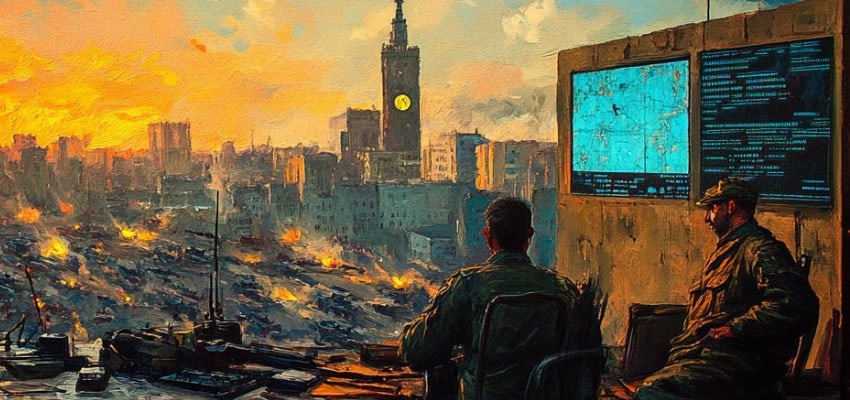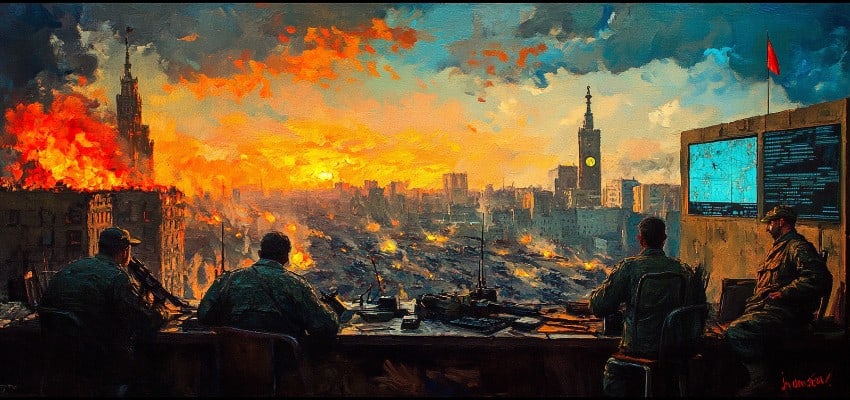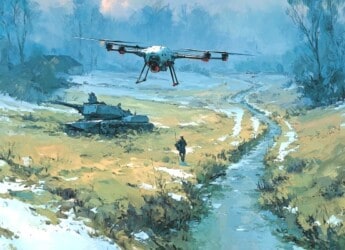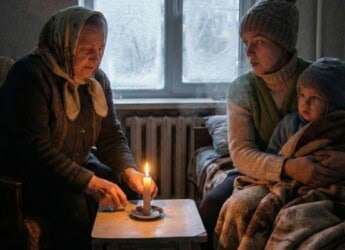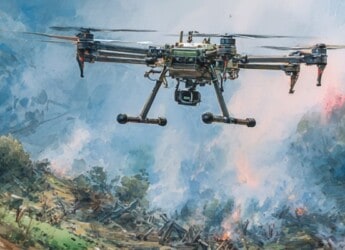Editor’s Note: This report provides an in-depth analysis of the latest developments in the Ukraine conflict as of August 2, 2024. It focuses on key strategic movements, military operations, and geopolitical implications based on the detailed assessments by the Institute for the Study of War. It also elaborates on the strategic use of propaganda, legislative actions, and military operations by Russia to achieve it’s special operation aims. This document is intended for readers with a keen interest in military strategy and geopolitical affairs.
For those seeking to grasp the full scope of this evolving landscape, the complete updates from the Institute for the Study of War serve as an invaluable resource.
Content Assessment: Propaganda, Legislation, and Warfare: Unpacking Russia’s Strategy in the Ukraine War
Information - 92%
Insight - 94%
Relevance - 90%
Objectivity - 94%
Authority - 96%
93%
Excellent
A short percentage-based assessment of the qualitative benefit expressed as a percentage of positive reception of the recent Russo-Ukrainian conflict update from ComplexDiscovery OÜ based on reporting from the Institute for the Study of War.
Background Note: ComplexDiscovery’s staff offers distinctive perspectives on the Russo-Ukrainian war and Iran-Israel conflict, informed by military experience on the West German, East German, and Czechoslovakian border during the Cold War and in Sinai as part of Camp David Accord compliance activities. This firsthand regional knowledge has been further enhanced by recent staff travels to Eastern European countries, including Estonia, Latvia, Lithuania, and Poland. These visits have provided up-to-date, on-the-ground insights into the current geopolitical climate in regions directly impacted by the ongoing conflict.
Combined with proficiency in cybersecurity, information governance, and eDiscovery, this multifaceted experience enables comprehensive analysis of these conflicts, including the critical impact of cyber warfare, disinformation, and digital forensics on modern military engagements. This unique background positions ComplexDiscovery to provide valuable insights for conflict-related investigations and litigation, where understanding the interplay of technology, data, and geopolitical factors is crucial.
Russo-Ukrainian Conflict Update*
Propaganda, Legislation, and Warfare: Unpacking Russia’s Strategy in the Ukraine War
ComplexDiscovery Staff
The ongoing and complex conflict in Ukraine continues to evolve, with recent assessments highlighting a multifaceted strategy by Russia to undermine Ukrainian efforts and maintain its own operational momentum. Brigadier General Andriy Hnatov, commander of the Ukrainian Joint Forces and Khortytsia Group, has emphasized that Russia’s primary objective remains to force Ukraine into extended defensive operations. This strategy, particularly evident in northern Kharkiv Oblast, seeks to deplete Ukrainian resources and manpower, thereby preventing the accumulation of strength necessary for counteroffensive operations.
Background and Historical Context: The conflict in Ukraine, which began in 2014 with the annexation of Crimea by Russia and the subsequent war in the Donbas region, has seen numerous phases and escalations. The full-scale invasion by Russia in February 2022 marked a significant escalation, leading to widespread international condemnation and extensive military engagements across Ukraine.
Current Strategic Dynamics: According to General Hnatov, the Russian military command initiated the offensive in northern Kharkiv Oblast in early May 2024 with the explicit aim of diverting Ukrainian forces from other critical sectors. This offensive was designed to complicate Ukrainian force rotations and compel the commitment of newly generated troops to defensive roles rather than allowing them to be held in reserve for future counteroffensives. This deliberate attritional strategy aligns with broader Russian efforts to maintain the strategic initiative across the theater of operations, thereby constraining Ukrainian capabilities to contest battlefield dominance.
Challenges Faced by Russian Elite Units: In a notable development, Colonel General Mikhail Teplinsky of the Russian Airborne (VDV) and “Dnepr” Group of Forces addressed his troops on the 94th anniversary of the VDV’s formation. Teplinsky’s address aimed to reinforce the VDV’s elite status despite the harsh realities faced on the ground. The VDV, traditionally considered an elite force within the Russian military, has been significantly degraded due to high casualties and the demanding nature of their current operations. Reports indicate that VDV units are now functioning similarly to understrength motorized rifle units, a far cry from their former elite designation.
Teplinsky’s address is particularly noteworthy given recent speculations about his fate following a Ukrainian strike on a Russian command post in Kherson Oblast. While unconfirmed, these speculations have fueled discussions about the resilience and morale within Russian elite units. Despite these challenges, Teplinsky highlighted the numerous awards and recognitions received by VDV personnel, underscoring the ongoing efforts to maintain the force’s prestige and morale.
Internal Military Dynamics and Disciplinary Measures: Meanwhile, internal dynamics within the Russian military continue to unfold. On August 2, Russian authorities arrested Colonel Dmitry Peshkov, the former deputy rear commander of the 144th Motorized Rifle Division, on charges of embezzlement. Peshkov’s arrest, linked to the alleged misappropriation of food rations meant for Russian soldiers, reflects a broader Kremlin initiative to enforce discipline and loyalty among high-ranking officers. This move is seen as part of an effort to indirectly address the operational failures and maintain a cadre of compliant and loyal officers within the Russian Ministry of Defense.
In a significant legislative development, the Russian Federation Council passed amendments that allow military commanders to discipline subordinates for “gross disciplinary offenses,” including the use of personal electronic devices on the frontlines. This decision followed significant backlash from Russian milbloggers, who criticized the initial version of the amendment for being out of touch with the practical realities faced by troops. The updated language clarifies that personal devices used for combat operations, such as controlling reconnaissance or strike drones, are exempt from these disciplinary measures. This highlights the Russian military’s reliance on personal devices for command and control functions and the challenges associated with regulating their use in a high-intensity conflict environment.
Control Over Information and Migrant Rights: Further legislative actions by the Russian Federation Council have focused on tightening control over the domestic information space and imposing additional restrictions on the rights of migrants. The newly passed bills require social media channel owners with over 10,000 subscribers to provide personal identification information to Russian federal censors and impose limits on the number of SIM cards that foreigners can purchase. These measures also allow for the termination of naturalized citizenship for migrants who fail to register for military service and restrict migrants’ rights to open bank accounts, drive cars, get married, and purchase property. These legislative efforts underscore the Kremlin’s intent to maintain strict control over information dissemination and address perceived threats to domestic stability.
Geopolitical Contest in Moldova: In the political arena, the pro-Kremlin Moldovan Victory opposition electoral bloc has announced Vasile Bolea as their candidate for the upcoming October 2024 Moldovan presidential election. Bolea’s platform emphasizes restoring Moldova’s relations with Russia and prioritizes integration with Russian-led economic and political alliances such as the Eurasian Economic Union (EAEU) and BRICS. This candidacy reflects broader Russian efforts to influence Moldova’s political trajectory and counteract its aspirations for European integration. Bolea’s nomination also signals potential divisions within Moldova’s pro-Russian opposition, which could impact the Kremlin’s strategy to destabilize Moldova and hinder its EU accession efforts.
Military Operations on the Ground: On the ground in Ukraine, Russian forces have recently achieved tactical advances near Toretsk, Avdiivka, and Donetsk City. These gains, although limited, underscore the dynamic and contested nature of the frontline. Russian military operations in these areas are part of broader efforts to capture key positions and maintain pressure on Ukrainian forces. Despite facing Ukrainian counterattacks, Russian units have managed to make incremental advances, highlighting the ongoing intensity of the conflict.
Integration of Occupied Territories: A delegation of Kremlin officials visited occupied Zaporizhia and Kherson oblasts on August 2, underscoring Russian efforts to integrate these territories into the Russian Federation. The visit, led by Russian First Deputy Head of the Presidential Administration Sergei Kiriyenko and Russian Health Minister Mikhail Murashko, focused on showcasing Russian modernization efforts in local infrastructure and healthcare. These visits are part of a broader strategy to consolidate administrative control and promote the integration of occupied Ukrainian territories into Russia.
Technological Adaptations and Production Challenges: In another development, Russian officials have been addressing ongoing criticism regarding the country’s drone production capabilities. Former Roscosmos head Dmitri Rogozin highlighted the need for greater competition and innovation within the drone production sector to address concerns about the quality and reliability of drones used by Russian forces. This acknowledgment reflects the broader challenges within the Russian defense industry and the importance of technological advancements in modern warfare.
Information Operations and Propaganda: Information operations and propaganda continue to play a significant role in the conflict. An investigation by the independent Ukrainian media organization Texty.org.ua revealed extensive use of social media platforms like TikTok by Russian-affiliated actors to spread disinformation and undermine Ukrainian morale. These operations, designed to propagate pro-Russian narratives and discourage support for Ukraine, highlight the sophisticated nature of information warfare in the current conflict.
A recent misrepresentation of a public opinion poll by a prominent Russian milblogger further exemplifies the information manipulation tactics employed. The milblogger falsely claimed that a majority of Ukrainians favored negotiations with Russia, omitting the critical context that most respondents insisted on negotiations only under conditions that preclude territorial concessions and preserve Ukraine’s aspirations for NATO and EU membership. This deliberate distortion aims to shape perceptions and undermine support for the Ukrainian government and military efforts.
Regional Geopolitical Concerns: In the broader geopolitical context, a prominent Kremlin-affiliated milblogger has expressed concerns about declining Russian influence in Central Asia and the Caucasus. The milblogger criticized the diminishing presence and impact of Russian-run “Slavic” universities in countries like Armenia, Kyrgyzstan, and Tajikistan, suggesting that this has allowed for the growth of “Russophobic” sentiments. These narratives reflect broader anxieties within Russia about its waning influence in the region and the increasing role of Western actors.
Activity in Belarus: Amidst these developments, significant activity continues in Belarus, although there are no major updates to report. The ongoing efforts to increase Russian military presence and integrate Belarus into Russian-dominated frameworks remain a critical aspect of the regional security dynamics.
Conclusion: Overall, the current situation in Ukraine is characterized by a complex interplay of military operations, strategic maneuvers, and geopolitical contests. Russia’s efforts to force Ukraine into defensive postures, maintain strategic initiative, and control information dissemination are central to its approach. Meanwhile, Ukraine continues to resist and counter these efforts, highlighting the resilience and determination of its forces.
News Sources
As a leading source for cybersecurity, information governance, and legal discovery insights, including international investigations and litigation, ComplexDiscovery OÜ recognizes the importance of awareness regarding alleged and documented criminal acts, particularly in the context of the Russia-Ukraine conflict. While we, following the lead of the Institute for the Study of War (ISW), do not provide detailed coverage of war crimes in our primary reports, we encourage professionals within the eDiscovery ecosystem to stay informed about these activities. This awareness is crucial for understanding potential future legal actions and responsibilities.
Detailed Reporting with Maps for August 2, 2024, from the ISW – Mouseover to Scroll
Ukraine Control of Terrain August 2 2024Review the Detailed Reporting and Maps PDF
About the Institute for the Study of War Research Methodology
ISW’s research methodology relies on both primary and secondary sources, enabling researchers to develop a comprehensive understanding of the situation on the ground. In order to analyze military and political developments in any given area, ISW’s research analysts must wholly understand the systems of enemy and friendly forces. They must also understand the population demographics, physical terrain, politics, and history of that area. This lays the analytical foundation for understanding the reasons for particular developments and fulfilling their assigned research objectives. ISW analysts also spend time in places like Iraq, Afghanistan, and elsewhere in order to gain a better understanding of the security and political situation and to evaluate the implementation of current strategies and policies. Our researchers compile data and analyze trends, producing a granular analysis of developments in areas of research, producing an accurate, high-resolution, timely, and thorough picture of the situation. ISW’s research methodology guarantees its success and commitment to improving the nation’s ability to execute military operations, achieve strategic objectives, and respond to emerging problems that may require the use of American military power.
About the Institute for the Study of War
The Institute for the Study of War advances an informed understanding of military affairs through reliable research, trusted analysis, and innovative education. They are committed to improving the nation’s ability to execute military operations and respond to emerging threats in order to achieve U.S. strategic objectives. ISW is a non-partisan, non-profit, public policy research organization.
Learn more, get involved, and contribute today.
Additional Reading
- From Dissent to OSINT? Understanding, Influencing, and Protecting Roles, Reputation, and Revenue
- [Annual Update] International Cyber Law in Practice: Interactive Toolkit
- Data Embassies: Sovereignty, Security, and Continuity for Nation-States
Assisted by GAI and LLM Technologies
* Sourced and shared with direct express permission from the Institute for the Study of War (ISW).
Source: ComplexDiscovery OÜ
